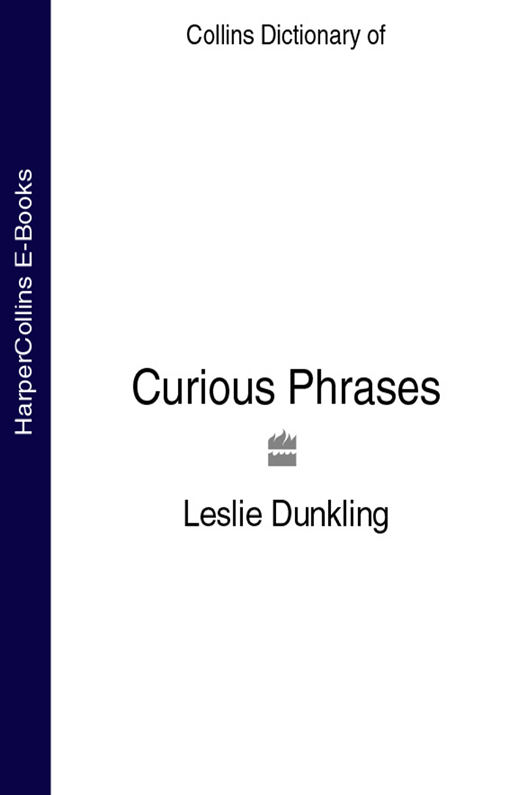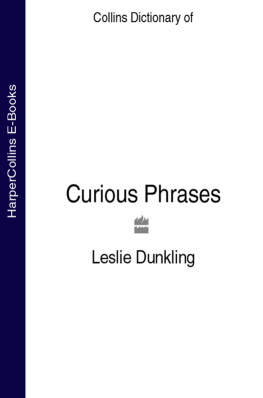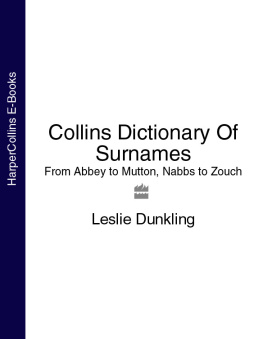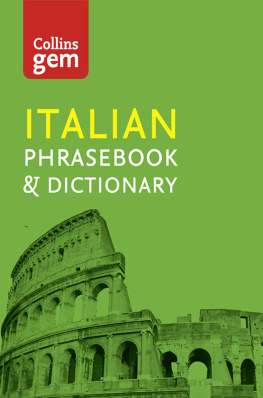
Collins
A division of HarperCollinsPublishers Ltd,
77-85 Fulham Palace Road,
Hammersmith, London W6 8JB
www.harpercollins.co.uk
First published 1998
Revised edition published 2004
Leslie Dunkling 1998, 2004
A catalogue record for this book is available from the British Library
All rights reserved under International and Pan-American Copyright Conventions. By payment of the required fees, you have been granted the nonexclusive, nontransferable right to access and read the text of this e-book on-screen. No part of this text may be reproduced, transmitted, downloaded, decompiled, reverse-engineered, or stored in or introduced into any information storage and retrieval system, in any form or by any means, whether electronic or mechanical, now known or here in after invented, without the express written permission of HarperCollins e-books.
HarperCollinsPublishers has made every reasonable effort to ensure that any picture content and written content in this ebook has been included or removed in accordance with the contractual and technological constraints in operation at the time of publication.
Source ISBN: 9780007165964
Ebook Edition JUNE 2014 ISBN: 9780007598120
Version: 2014-06-12
CONTENTS
There are many phrases in English which are not meant to be taken literally. If we hear that someone has kicked the bucket, for instance, we dont think that the person concerned has actually kicked a bucket. We know that the reference is to someone who has died. Most of the time we use such phrases without much thought, but there comes a time when we ask ourselves why do we say that? Why do we let the cat out of the bag, get down to brass tacks, take a busmans holiday? This book sets out to explain the origins of these and similar metaphorical phrases, showing how they have evolved through the centuries.
Some people might argue that such phrases should be avoided by a careful speaker or writer because they are clichs. This comment usually implies that a hackneyed phrase has been used in a lazy way, that a more original way of expressing the thought could have been found. But frequency of use does not automatically create a clich. Just as one word correctly describes a specific object or idea, so a particular phrase may be the correct one to use in specific circumstances. Formulaic phrases such as Good morning, How do you do? Merry Christmas, Many happy returns of the day are, in one sense, hackneyed phrases or clichs which are constantly used, but it would be absurd to say that every speaker should find another way to express such ideas. A great many other phrases are also prompted by situations that regularly occur. The childrens misbehaviour once again makes it necessary to read the Riot Act. An approaching examination means that one must keep ones nose to the grindstone.
It is phrases of this type which some would call clichs. Others see them as the linguistic equivalent of philosophical shrugs, an acceptance that familiar circumstances, albeit unpleasant ones, have once again arisen. The familiar words that are used can be rather comforting to both speaker and listener. The underlying message is: at least we are not dealing with the unknown; this is a well-enough known human situation to have its own linguistic convention.
Children learn a number of set phrases at an early age which enable them to cope with recurring situations. Finders keepers! traditionally establishes ownership of something they stumble across. If they are taunted in the playground because they are too clever or too stupid, too tall or too small, too fat or too thin, cry too easily, have red hair, wear glasses or generally offend others by being different in some way, they need to be able to respond quickly with a suitable retort. This may be no more than Same to you with knobs on, Do me a favour drop dead, or Sticks and stones may break my bones, but names will never hurt me. Only the verbally gifted will be able to rely on the inspiration of the moment and say something original. The average child will be content to use any appropriate phrase which deflects the verbal attack and perhaps gives him the last word. Situational phrases, in other words, are recognised as being useful from a very early age. Genuine clichs are probably those phrases which contribute nothing to the meaning of what is being said and give no psychological comfort to speaker or hearer. Some people constantly preface a sentence with I must admit that, I must confess that, To tell you the truth, The fact is, As a matter of fact, or Lets face it. These are merely verbal tics which distract and irritate the listener. While such phrases should be avoided, a large number of metaphorical idioms have an essential part to play in spoken and written English. Many of them are as interesting as they are useful, and, as the literary quotations in this book demonstrate, they can often be used imaginatively by good writers and speakers. The stories which lie behind their origins also reveal much about our social and linguistic history. These are phrases which thoroughly justify their role in the language, and there is certainly no reason to be ashamed of them.
A
Achilles Heel Achilles was a legendary warrior, the chief hero on the Greek side in the Trojan War. He had been plunged into the Styx by his mother while still an infant, making him invulnerable except in the heel by which he was held. When Paris was told by Apollo of this one weakness, he shot an arrow into Achilles heel and killed him. The story is recalled in the name of the Achilles tendon, which is just above the heel.
Samuel Taylor Coleridge made metaphorical use of the Greek tale, referring in 1810 to Ireland, that vulnerable heel of the British Achilles! Since then the phrase has been generally applied to any weakness in someone or something that is otherwise strong. In one of his letters, for example, George Bernard Shaw says that divorce is the Achilles heel of marriage. In 1972 the Catholic Herald was of the opinion that it is this refusal to condemn which is the Achilles heel of contemporary Christian psychology. The Achilles heel of the American physicist Julius Oppenheimer, according to one commentator, was his overriding loyalty to his friends. Another writer said of Trotsky: By his verbal artifices, he only discloses his own Achilles heel.
Airs, Put on The word air has many different meanings, one of which refers to a persons manner and appearance, to the aura that surrounds him. In a famous music-hall act, Fred Gilbert used to strut around the stage and sing:
As I walk along the Bois Bou-long,
With an independent air,
You can hear the girls declare,
He must be a millionaire!
You can hear them sigh and wish to die,
You can see them wink the other eye
At the man who broke the Bank at Monte Carlo.
To have an air about one, independent or not, has always been acceptable. In its plural form the word immediately suggests unacceptable behaviour. Since at least the early eighteenth century, to put on or give oneself airs has been irritating to others. In 1712 Sir Richard Steele was already writing, in an issue of The Spectator, This Creature came among us only to give herself Airs, and enjoy her full Swing in being admird. Modern writers use the same expression to refer to someone acting in an affected, haughty manner. In The Masters C.P. Snow writes: Do you think Im going to vote for a man whos taking it for granted hes been elected and is behaving like the Master before the present one is dead? And whose wife is putting on airs about it already? Harper Lee, in
Next page











